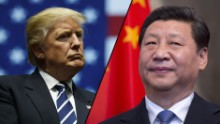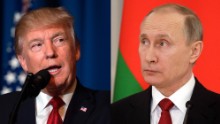I personally think they are right. Who wants a leader that isn't loyal to his own people, top to bottom. Who is going to follow this man to their deaths? No one I know of even sees him as their president but only as a fool pretending to be president.
Trump is the most dangerous president since I have been born in 1948. Nixon earned people's loyalty and he and Kissinger kept China from going to war with us by developing them as Trade partners while he was president. This I think we all need to be grateful that we didn't have a land or nuclear war with them already because of Nixon and Kissinger.
Trump is not a leader, he is a joke and an embarrassment and he might get everyone on earth killed because of it. (or at the very least most of us). So, if you are living in a new post nuclear war apocalyptic stone age 20 years from now you can thank Trump for overestimating his skills as a president.
begin quote from:
Tested at home and abroad
begin quote from:
Trump's difficulties at home are seen by foreign leaders as a sign of weakness, analysts say
Foreign policy challenges escalate amidst Trump's domestic turmoil
Washington (CNN)President
Donald Trump's turbulent few weeks at home -- the palace intrigue of
White House rivalries, sudden departures and legislative defeats -- have
been echoed by a brewing storm of challenges overseas.
One set of problems may be affecting the other, analysts say.
North
Korea is launching missiles designed to reach the US; Moscow is forcing
a drastic reduction in US diplomatic staff in Russia; Venezuela is
wracked by violence as its democracy dies; and Iran has been expanding
its reach in Syria and Iraq.
These
situations have been festering as the President, in his first seven
months, has gone through two chiefs of staff, two national security
advisers, two communications directors, one FBI director, a deepening
investigation into his campaign's ties to Russia and a struggle to
advance his domestic agenda.
Rumors
that Trump would also like to replace his attorney general, Jeff
Sessions, have gained enough traction that lawmakers are publicly
warning him against it. They've already moved to curtail his ability to
independently ease sanctions on Russia.
Some
analysts say the President's difficulties at home are seen by foreign
leaders as a sign of weakness -- prompting tests from adversaries like
North Korea and Iran, and end-runs from allies who are now spending more
time and energy appealing to Congress or directly to states on issues
like climate change or NAFTA renegotiation.
"People
abroad see the defeat on the Russia sanctions bill, they see the defeat
on health care and they come to the conclusion that this guy is very
weak," said Daniel Serwer, director of the Conflict Management Program
at the Johns Hopkins School of Advanced International Relations.
Serwer
said Trump is proving to be "a terrible negotiator" on the
international stage, giving rivals like China and Russia concessions
without getting returns.
Others
say Trump is making concrete progress, comparing him favorably
to President Barack Obama as the US-led coalition makes progress in the
fight against ISIS and builds up its military presence along the border
with Russia.
"Things are moving in
the right direction," said Nile Gardiner, director of the Margaret
Thatcher Center for Freedom at the Heritage Foundation. He added that
many of the challenges facing the President, including getting China to
apply greater pressure to North Korea, are deeply complex.
The
White House didn't return calls for comment about Trump's foreign
policy slate, but Trump himself offered assurances at his second full
Cabinet meeting on Monday.
"North
Korea, Middle East, lots of problems that we inherited from previous
administration, but we will take care of them," the President said. "We
will take care of them very well. But overall I think we are doing
incredibly well."
One frequent
critic immediately made a link to Trump's domestic affairs. "Forgive us
if we're not reassured," tweeted California Rep. Adam Schiff, the
leading Democrat on the House Intelligence Committee, in response to the
President's claim about North Korea. "If @POTUS handles NK like
everything else, we can only expect blame-shifting, resignations and
profanity."
North Korean threat
It's
complicating foreign policy matters that the White House and State
Department still aren't fully staffed with advisers -- and the Trump
administration's plan to cut the State Department budget by 30% means
that agency will be in flux for many months to come.
The
list of foreign policy challenges starts with North Korea and wraps
around the globe, from Afghanistan to the Mideast, Africa, Europe and
South America. None perhaps is more urgent that the North Korean threat
to target the US with a nuclear missile.
In
early January, before his inauguration, Trump said that Pyongyang "had
stated that it is in the final stages of developing a nuclear weapon
capable of reaching parts of the U.S. It won't happen!"
This July, Pyongyang test fired two ICBMs, a missile capable of reaching the US, and has threatened a nuclear strike "in the heart of the US."
Pentagon
officials said North Korea conducted another missile-related test
Monday and the US detected "highly unusual and unprecedented levels of
submarine activity."
At his Cabinet
meeting that morning, Trump told reporters, "we will handle North
Korea. We will be able to handle them. It will be handled. We handle
everything." So far, the US has taken no visible steps against
Pyongyang.
Gardiner points out
that this won't be solved quickly, and that for decades the
international community failed to find a way to stop North Korea's
nuclear program.
"It's not easy to
generate quick results," he says. "Clearly more needs to be done in
terms of pressuring China," which accounts for the bulk of North Korea's
trade. But he adds that China and Russia, both permanent members of the
UN Security Council, "are very, very difficult to deal with when it
comes to North Korea."
Trump
initially tried to enlist China to pressure Pyongyang, giving President
Xi Jinping the star treatment at his Mar-a-Lago estate and scaling back
criticism of Beijing as a currency manipulator. For those concessions,
"he's not gotten a much tougher line on North Korea," said Aaron David
Miller, a vice president at the Wilson Center.
Indeed,
on Saturday, Trump tweeted that he is "very disappointed in China." He
went on to tweet that, "they do NOTHING for us with North Korea, just
talk. We will no longer allow this to continue. China could easily solve
this problem!"
Administration
officials hint that sanctions may be coming on Chinese companies, banks
and individuals that do business with North Korea.
Miller,
who sees some of Trump's policies as sensible, says that as with China,
Trump has made concessions to Russia, but the US has little to show for
it publicly. The US has essentially accepted Russia's plan that Assad
should stay -- or at least not be removed immediately -- and has agreed
to a central Russian demand that it stop funding moderate Syrian
rebels.
Lethal arms
But
Trump has followed through on an Obama administration initiative to
increase the number of troops along the border with Russia in Eastern
Europe and is considering sending lethal arms to both Georgia and
Ukraine, a prospect that would deeply unsettle Moscow. White House press
secretary Sarah Huckabee Sanders said that he's "reviewing his options"
for a response to Russia's expulsion of US diplomats. So far, the
White House has been silent.
In
Syria, the anti-ISIS coalition is making progress in pushing the terror
group out of the territory, but it is going underground and the threat
it poses is evolving. Miller notes that Trump's aversion to a large
increase in troops or spending huge amounts on reconstruction is
consistent with cautious Obama administration policies.
Trump also faces decisions about how to approach Afghanistan and whether to increase troop levels there.
And
the administration is signalling it may walk away from the nuclear
agreement with Iran, a deal Trump campaigned strenuously against. That
would roil the EU, with which the Obama administration reached the deal,
along with Russia and China.
Gardiner
says the "agreement is a failure" and should be abandoned. Miller says
he "can't even begin to comprehend" why Trump would walk away from it.
"So far, our anti-Iranian rhetoric has exceeded our actions," said
Miller. With active military challenges in Afghanistan, Syria and Iraq,
"why would you want to open another front? What possible utility would
that serve?" he asked.





















No comments:
Post a Comment